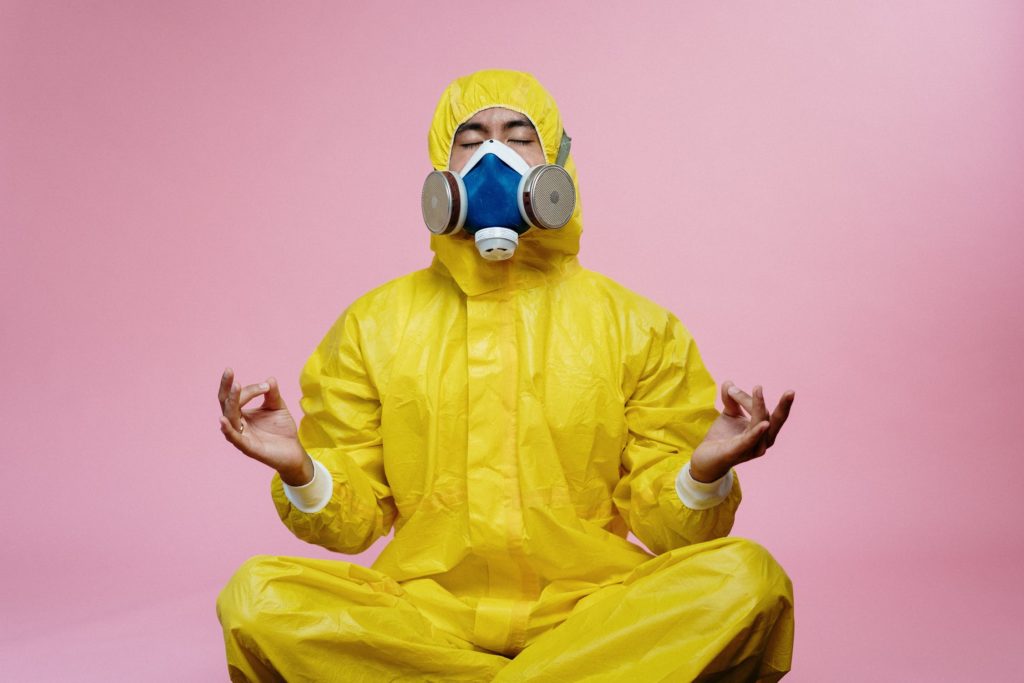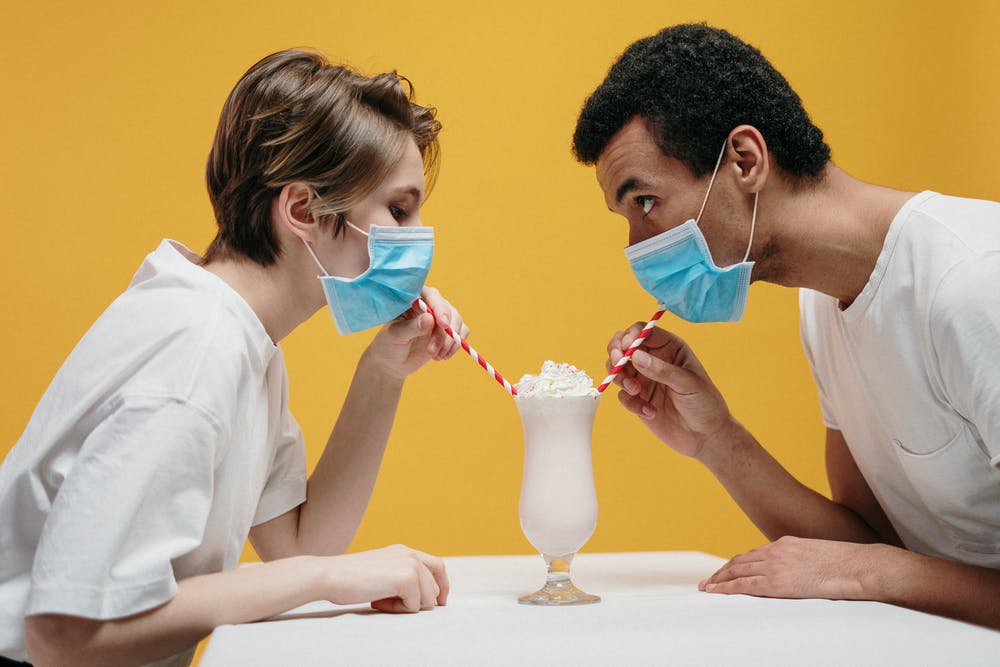If you’re like most of us at The Prepared, you’ve been on lockdown for months due to the COVID-19 pandemic. And, like us, you’ve probably spent the past few weeks watching friends go to bars, gyms, and the beach. Some people are even going on vacations. Meanwhile, COVID-19 cases are on the rise in much of the country and essential workers and vulnerable populations are still at very high risk. If you’re like us, seeing what’s happening in the news probably makes you feel like you’re living in an alternate universe.
We’re here to tell you that no, you’re not on crazy pills.
Being a prepper means being ahead of the curve, especially in times like these when we’re in the midst of a major pandemic and civil unrest. But that doesn’t make it easy. The licensed therapists and psychologists we’ve spoken to said it’s normal to have an acute stress response when things around you are, in fact, acutely stressful. During a crisis, it’s normal to feel fear and anxiety. That’s actually what motivates people to engage in rational prepping.
When there are lots of unknowns and the world feels anything but normal, it’s common to experience lack of sleep and anticipatory anxiety and grief. So the most important thing we can tell you here is that it is not pathological to be or to have been upset by all of this. We need to be gentle with ourselves for feeling stressed.
But if your feelings are starting to interfere with your relationships or work, it’s time to seek care. Many mental health professionals are offering telehealth services right now, which can be both safe and helpful.
Here’s what you need to know:
- It’s important to maintain a routine to maintain a sense of normalcy.
- Cut yourself some slack. We’re in a stressful time.
- Stop reading all the news, and set limits where they feel helpful.
- If you’re committed to staying locked down, it’s time to learn something new.
- Stay connected to friends and loved ones, but don’t be afraid to assert your boundaries.
- Practice distinguishing your own needs from your wants when deciding when to venture out into the world.
The virus is not gone
First, a quick dose of reality before we dive in to what mental health professionals shared with us. It’s important to remember that there’s a reason we’re all feeling so stressed and overwhelmed.
You might be tired of the virus, but it’s not tired of you.
The fact is, despite reductions in some areas, the coronavirus is spreading like wildfire in others. It’s also coming back in places thought to have eradicated it. Here are just a few examples:
- In the United States, Arizona, Florida, and Oklahoma are experiencing all-time high infection rates.
- Despite China seemingly having the virus under control, Beijing is closing schools and tightening restrictions after a new outbreak.
- New Zealand announced they had eliminated the virus, only for two women from the United Kingdom to bring it back.
Many have tried to act as though cases are falling, but that’s just not the case. On June 16, the Centers for Disease Control announced 18,577 cases in a single day, with deaths in the United States at over 116,000.
More of our reporting on COVID spread:
- The WHO absolutely did not say those without symptoms can’t spread coronavirus
- State of the Pandemic, June 2020, Part I: What we know about SARS-CoV-2
- Study shows ‘silent’ COVID-19 infections more widespread than expected
It is worse than the flu
Another common denial is that COVID-19 is no worse than the flu, but that just isn’t true. Let’s look at a few facts:
- Johns Hopkins reports that from October 1, 2019 to April 4, 2020, up to 62,000 people died from the flu. Over 119,000 Americans have already died from COVID-19.
- Unlike the flu, COVID-19 can cause months of debilitating symptoms, such as fatigue, lost of taste and smell, short-term memory loss, breathing problems, and others. And these are what are supposed to be mild cases.
- Other strange COVID-19 symptoms include thickening of blood and blood clots and mysterious foot lesions known as “COVID toes.”
- A study recently published in the Lancet Journal estimates that 22% of people worldwide are at risk of serious illness if they contract COVID-19.
The repercussions are not small
If it seems like everyone around you is getting back to life as it was, know that looks can be deceiving. Here are a few examples of repercussions of not taking the virus seriously:
- Twenty-four Auburn students who attended gatherings later tested positive for COVID-19.
- Bars in Arizona are regularly packed, despite cases exploding in that state.
- Bars have been forced to close again in Florida due to COVID-19 cases, such as a 40-year-old healthcare worker and her 15 friends who were infected after a night on the town.
- South Carolina Representative Tim Rice, who refused to wear a mask in public, has now contracted COVID-19.
A teenager might look at friends engaging in irresponsible behavior and assume that, because they seem fine, that it’s safe to act that way. In fact, they might even grow resentful, feeling that life is passing them by as they walk the straight and narrow. But just as you might know from experience, it’s often the people who seem to be the life of the party who end up with a mess of problems. The same thing is happening now. While other people go to parties, bars, restaurants, and even church, the virus is slowly spreading again.
Okay, now take a deep breath
There’s a lot going on. And as you watch people flock to bars and restaurants again, you might feel afraid for their safety, angry that they’re not being responsible, and envious of them for going out while you’ve been stuck at home for four months. Now, “take a breath… and know that aspects of lockdown can feel frustrating,” said William Schroeder, co-founder of Just Mind Counseling in Austin, TX.
“As society begins to open back up and things feel more ‘normal,’ people should realize that the sadness and frustrations we have felt are going to take time to process. The effects of this worldwide trauma aren’t going away anytime soon,” said clinical psychotherapist and Executive Director of The Willow Center, Erin Wiley from Toledo, OH. “So that’s the first step. Recognize that what’s happening is real and it causes very real stress.”
Staying Sane
Now, how can you relieve some of that anxiety and stay sane in such insane times? That’s been our big question. So we contacted a bunch of mental health professionals and gathered their most helpful recommendations for coping as we enter our fourth month of however much lockdown is to come.
Create a routine
One of the top recommendations from the experts: create a routine and stick to it.
Dr. Keba Richmond Green from Lawrenceville, GA: “Have a routine as much as possible, especially for kids. Try to keep and continue your schedule, be consistent, this is better for our mental health. Research and studies all show that if we can keep bedtime, eating meals, school work, etc., on a schedule it, helps us function and operate better.”
“Working from home, kids at home with potential for home-schooling, and new schedules can mess you up. Come up with a basic daily schedule that is reasonable and flexible, but present,” said clinical therapist Joseph Tropper at Core Wellness in Baltimore, MD.
“Another way to cope with mental stressors during lockdown is to try and maintain a routine to the best of your ability, but don’t be too hard on yourself. If you’re staying up late, eating a poor diet, and not sticking to a daily schedule, life can become a little chaotic. Try to keep your home and your life organized. For example, stick to a regular sleep schedule, eat a healthy diet, get some exercise, and don’t neglect your usual responsibilities,” said Dr. Brian Wind, the Chief Clinical Officer of Journey Pure and an adjunct professor at Vanderbilt University.
“The best way to help your mental health during lock-down is to set up some form of structure in your house. Create a small agenda of things you would like to get done during the day with scheduled breaks to eat and non-productive times,” said licensed marriage and family therapist Jessica Jefferson from Cloud Nine Therapeutic Services.
“Routines are important for a variety of reasons,” William Schroeder said. “Look at things that help you keep up with routines. This could include keeping the blinds open to let natural light wake you each morning.”
Be kind to yourself
While it’s good to have a routine and take care of business, you need to take care of yourself too. The experts recommend going easy on yourself, both in rewarding yourself for jobs well done, and in not beating yourself up when you don’t accomplish everything you set out to do or when you feel stressed.
“Acknowledge the tasks that you got done with a small reward for yourself. Whether it is a snack, a nice bath, a Netflix binge, etc. But also make sure to be nice to yourself if you don’t get everything done,” Jefferson said. “Another great resource is to indulge in self-care. Whether that be exercise (if physically ok with your doctor), daily bubble baths, or even listening to your favorite playlist. If you don’t have anything that you enjoy doing, this is a great time to learn different things! Give yourself a chance to learn more about yourself.”
“Meet yourself where you are at,” said therapist Caitlin Garstkiewicz from Clarity Clinic in Chicago, IL. “To cope with the mental strain of COVID-19, it would be very helpful to listen to your needs and understand where you are at in any moment or day. Some days you may not feel like you have the capacity, whereas another you will feel as so. Be flexible and allow yourself to ride the waves of life.”
“Time in nature is a powerful tool for your mental health. Are there any parks around you that you can safely visit with proper precautions? Even a simple 30-minute walk is proven to be beneficial due to exposure to the sun, outdoors, and getting your blood flowing. Any activity or action is better than inaction and waiting idly by,” said Schroeder.
“Lower your expectations and standards for yourself to give yourself a break,” said clinical psychologist Dr. Abby Lev from San Francisco, CA. “We cannot be functioning as efficiently during a global crisis as we did in the past. We have to give ourselves permission to be less productive, less efficient, and less of ourselves in general.”
“Do one thing a day that you enjoy or that gives you pleasure. Give yourself permission to treat yourself, and do rewarding and pleasurable things,” added Lev.
Cut back on news
Another tip from the experts is to cut back on news and be more selective about what you read.
“There’s a lot going on right now and the news is heavy, so it’s important to limit the time you spend reading the news and be careful of the sources you obtain that news from. If you’re getting your news from social media and spending hours online each day, you’re inevitably going to feel a little anxious or stressed out,” said Wind.
“Notice what puts you in a funk. Too much news or time on social media? Think about pulling back,” Schroeder said. “Likewise, delete news and social media apps from your phone so you don’t graze online when you could be doing something more beneficial to your quarantine time.”
“Pick a small list of reliable sources and stop reading things that make you anxious,” said Tropper.
Stay busy (if you find yourself with lots of unstructured time)
While working parents on lockdown with small children have found themselves busier than ever and overwhelmed with things to do, single people or those who’ve been laid off might be experiencing new levels of boredom. For those who find themselves with too much unstructured time, Dr. Ryan Drzewiecki, Director of Psychology at All Points North Lodge, recommends doing new things to create meaning in your life.
“Learning a new hobby, finding a new purpose, and creating something special are all great ideas. We are happiest when we are able to set our mind to a goal, strive to achieve it, and succeed despite challenges. Regardless of all the limitations quarantine brings, it is still necessary to find ways to set and meet new goals,” Drzewiecki said.
“Aggressively pursue interests that fit isolating at home. This could mean learning a new language or how to become a better chef at home. There are a million things out there which can help you to grow new talents or to foster current ones. Also, no better time to get back into reading, particularly if you have a topic you’re passionate about or want to learn more about but haven’t had the time,” said Schroeder.
I personally take comfort in prepping. Working on developing my bug-out bag and individual first-aid kit brings me a sense of peace, and they’re practical things to do as well.
Stay connected
The experts also recommend alternative ways to stay socially connected.
“At a time when social distancing is still strongly recommended, the importance of social connection is more important than ever,” said Drzewiecki. “You should stay connected with your loved ones and support network through the phone, video-conferencing, and other safe means. We are social mammals and need interpersonal relationships to regulate our mood and anxiety, so finding ways to connect in spite of all the restrictions is essential.”
“Many people have found creative ways to see and communicate with loved ones while being isolated,” said Green. “I even saw a post about friends who all parked their cars, let up the hatch, brought their own lunch and just talked and laughed inside their vehicles.”
“Find ways to connect with those who are special to you,” Schroeder said. “This could mean a virtual cocktail with friends or it could mean more regular check-ins with family via phone calls. Also, Nintendo Switch and other peer-to-peer gaming devices can be fun for adults too (not just kids toys in a pandemic) or apps like HouseParty, where you enjoy trivia with friends while on their version of FaceTime.”
But how can you deal with loved ones who aren’t taking the virus seriously?
“In order to preserve relationships, you may wish to withhold judgement of people who are choosing to respond to the pandemic in different ways than yourself,” said Drzewiecki. “Rather than condemning or critiquing their response to the crisis, you can simply state the decision that you’ve chosen to make. For example, saying ‘Let’s hold off on our visit for now as my family and I have decided to be extra cautious for the sake of the kids’ identifies your position without criticizing your loved ones.”
It’s also important to define your boundaries and stand by them.
“If you find that you are itching to see [loved ones] in person, assert some boundaries,” Jefferson said. “If they don’t seem receptive to your boundaries, then it is time for you to think about whether or not you want to risk it. It is important to have that conversation BEFORE you leave the home to make sure everyone is on the same page and that you don’t get disappointed later on.”
“If you have extended family who are not staying socially distant in a way that leaves you uncomfortable to be around them, you can explain it simply by letting them know that you have chosen to be more cautious than them, and it leaves you in a position where you will need to avoid contact with them for the time being. It’s important to establish firm boundaries for expected behavior in a kind, but definitive way. People can be frustrated and upset by your decisions, but there’s no need to defend your choice. Just validate your understanding that everyone is making the decision that feel right for them at this time, and that you are doing the same,” said Wiley.
When (and how) to end your lockdown
Many months ago, we predicted a two-week lockdown. For many of us now that’s extended into twelve or more weeks. The original goal was to “flatten the curve” of infection to avoid overloaded ICUs, and that has been largely successful. But with contradictory advice from authorities, it can be hard to see past the fog and get accurate advice.
Ultimately, the decision is on you. “Everyone is going to need to assess the level of risk they are comfortable taking, both for themselves and the people in their home,” said Wiley.
More: Doctors rank activities by COVID-19 risk
“As the virus remains a part of society, it is impossible to say when it will truly be safe, unless where the place you live has zero people with the virus, and nobody is allowed to enter the city,” said pharmacist Abdil Baholda, clinical lead of Prescription Doctor.
“Safety is really dependent on your level of comfort. Which is a good and bad thing. Unfortunately for many, their level of comfort means going back to ‘normal,’ while not taking into consideration that the world needs to adjust and shift to lower the chances of a second wave,” Jefferson said.
Jefferson says what’s important to remember is that you get to decide what works for you. So for many of us, the ‘reopening’ is a time to assess our wants and needs and make safe choices for ourselves. Here’s a simple way to figure out if it’s the right time to go out in public again:
- Take a chance to think about what you need to do and what you would like to to do.
- Evaluate the risks of each activity. We just published a post about how to do that reasonably.
- For the activities in your ‘need’ column, make a plan for how you to do them as safely as possible.
- For activities in your ‘like’ column, do your research. Contact the businesses that are in your ‘like’ column to see what precautions they’re putting into place. Decide if those precautions feel good to you, and then make a choice about whether you’ll start going back to those businesses.
- Then, make a back up plan in case reality doesn’t meet your expectations.
How you approach breaking your lockdown is up to you. It comes down to your individual needs vs. your wants. If you stand to lose your home if you don’t go to work, then you probably have no choice but to go to work. But for something like a grocery trip, you might find precautions aren’t up to your standards, and you might choose to have groceries delivered instead. You might wait to go to the beach until you see more precautions, even though you want to go now.
We hope these tips help you stay healthy, both mentally and physically. If you’re feeling particularly anxious, that’s perfectly normal during all *waves hands wildly around* this. And if you feel like it’s getting to be too much, a telehealth appointment with mental health clinicians could be a helpful, safe place to start.




You are reporting the comment """ by on